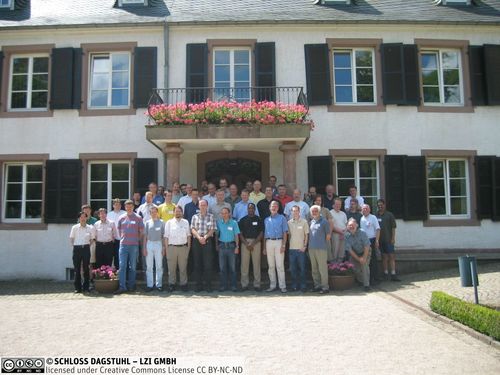Dagstuhl-Seminar 03301
Dynamically Reconfigurable Architectures
( 20. Jul – 25. Jul, 2003 )
Permalink
Organisatoren
- Peter M. Athanas (Virginia Polytechnic Institute - Blacksburg, US)
- Jürgen Becker (KIT - Karlsruher Institut für Technologie, DE)
- Gordon Brebner (Xilinx - San José, US)
- Hossam El Gindy (UNSW - Sydney, AU)
Kontakt
Sponsoren
Impacts
- Dagstuhl seminar dynamically and partially reconfigurable architectures : dynamisch und partiell rekonfigurierbare Architekturen : article S. 218-225 - Becker, Jürgen - München : Oldenbourg, 2004 - (Information technology : IT : 2004, 4, S. 218-225).
The Dagstuhl seminar on "Dynamically Reconfigurable Architectures" has been a very successful meeting of people from different research areas - algorithms, hardware architectures and circuits as well as optical communication.
The seminar showed that technological advances have opened up new ways of implementing complex systems in a way that blurs the barriers between hardware and software components development, and that existing design tools do not seem to be adequate for the necessary new design styles. Furthermore, new advances in optical communication lead to feasible implementations of interconnection structures which are getting not only theoretical value nowadays.
In recent years a rapidly growing interest in using reconfigurable computing architectures for realizing and developing application-specific computer systems has been observed. The advances in reconfigurable technologies, in algorithm implementation methods, and in automatic mapping methods of algorithms into hardware and processor spaces form together a new computing paradigm of computing and programming, e.g. "Computing in Space AND in Time". This requires different and new approaches in engineering for developing reconfigurable systems and implementing complex algorithms, including theory, architecture structures, algorithms, design systems and industrial applications that demonstrate the benefits of this promising way of computing.
The fast pace of development is leaving industry not enough time to develop the necessary theoretical foundation that underpins CAD tools, OS, designs, architectures and circuit technologies. Traditional hardware and software design processes and the tools to support them are not adequate for the design of run time reconfigurable systems. Therefore, the plan for this seminar is to focus on the issues relevant to the development of support for the meanwhile also in industry attractive reconfigurable technologies. A special focus will be given to dynamically run-time reconfigurable (RTR) solutions, since here system adaptivity and advantages of this technology are highly visible.
The seminar will cover: architecture structures, circuit technologies, system architecture, tools for RTR, general/special purpose system, and of course, existing and new application domains, where (dynamically) reconfigurable computing is more effective than traditional and parallel/distributed architectures. This includes also an appropriate set of models for reconfigurable systems which open ways for application designers and industry to develop efficiently their systems using appropriate high level languages. Especially the risk minimizing factors (time-to-market!) and adaptivity features (–> multipurpose/ multistandard possibilities!) are important arguments for industrial companies now, e.g. in (mobile) communication technologies, automotive area, etc. to integrate this flexible technology into their product strategy. Here Configurable Systems-on-Chip (CSoCs) solutions for embedded systems are giving valuable perspectives. We also think that the challenges posed by integrating optical technology with RTR should remain a considerable aspect of this seminar.
- Peter M. Athanas (Virginia Polytechnic Institute - Blacksburg, US) [dblp]
- Jürgen Becker (KIT - Karlsruher Institut für Technologie, DE) [dblp]
- Neil W. Bergmann (The University of Queensland - Brisbane, AU)
- Christophe Bobda (TU Kaiserslautern, DE)
- Jens Braunes (TU Dresden, DE)
- Gordon Brebner (Xilinx - San José, US) [dblp]
- Uwe Brinkschulte (KIT - Karlsruhe, DE)
- Damian Dalton (University College Dublin, IE)
- Hossam El Gindy (UNSW - Sydney, AU)
- Wolfram Hardt (TU Chemnitz, DE)
- Reiner Hartenstein (TU Kaiserslautern, DE)
- Christian Hochberger (TU Dresden, DE)
- Bernd Klauer (Universität der Bundeswehr - Hamburg, DE)
- Andreas Koch (TU Darmstadt, DE) [dblp]
- Steffen Köhler (TU Dresden, DE)
- Manfred Kunde (TU Ilmenau, DE)
- Loic Lagadec (University of Brest, FR)
- Carlos Humberto Llanos Quintero (University of Brasilia, BR)
- Wayne Luk (Imperial College London, GB)
- Usama Malik (UNSW - Sydney, AU)
- Theodore Marescaux (IMEC - Leuven, BE)
- Martin Middendorf (Universität Leipzig, DE)
- Adronis Niyonkuru (Universität der Bundeswehr - Hamburg, DE)
- Tobias Oppold (Universität Tübingen, DE)
- Thilo Pionteck (Universität Lübeck, DE) [dblp]
- Toomas Plaks (London South Bank Univ. - London, GB)
- Marco Platzner (Universität Paderborn, DE)
- Christian Plessl (ETH Zürich, CH)
- Sanjay Rajopadhye (Colorado State University, US)
- Franz J. Rammig (C-LAB - Paderborn, DE)
- Sergej Sawitzki (Philips Research Europe - Eindhoven, NL)
- Bernd Scheuermann (KIT - Karlsruher Institut für Technologie, DE)
- Hartmut Schmeck (KIT - Karlsruher Institut für Technologie, DE) [dblp]
- Heiko Schröder (RMIT University - Melbourne, AU)
- Tobias Schüle (TU Kaiserslautern, DE)
- Mark Shand (CNRS / ENS - Paris, FR)
- Richard Shoup (Quicksilver Technology - San Jose, US)
- John Snowdon (Heriot-Watt University Edinburgh, GB)
- Rainer G. Spallek (TU Dresden, DE)
- Piotr Stepien (Bournemouth University, GB)
- Keith Symington (Conjunct Ltd. - West Lothian, GB)
- Uwe Tangen (BioMIP - St. Augustin, DE)
- Jürgen Teich (Universität Erlangen-Nürnberg, DE) [dblp]
- Jim Torresen (University of Oslo, NO) [dblp]
- Jozsef Vasarhelyi (University of Miskolc, HU)
- Milan Vasilko (Univ. of Bournemouth, GB)
- Klaus Waldschmidt (Universität Frankfurt, DE)
- Markus Weinhardt (PACT XPP - München, DE)
- Hans Christoph Zeidler (Universität der Bundeswehr - Hamburg, DE)
- Andrej Zemva (University of Ljubljana, SI)
Verwandte Seminare
- Dagstuhl-Seminar 98081: Dynamically Reconfigurable Architectures (1998-02-23 - 1998-02-27) (Details)
- Dagstuhl-Seminar 00261: Dynamically Reconfigurable Architectures (2000-06-25 - 2000-06-30) (Details)
- Dagstuhl-Seminar 06141: Dynamically Reconfigurable Architectures (2006-04-02 - 2006-04-07) (Details)
- Dagstuhl-Seminar 10281: Dynamically Reconfigurable Architectures (2010-07-11 - 2010-07-16) (Details)


